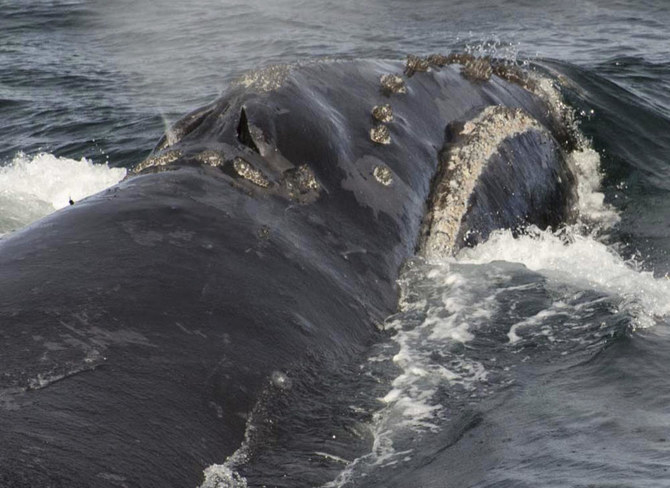ANCHORAGE, Alaska: For the first time, scientists have recorded singing by one of the rarest whales on Earth, and it just might be looking for a date.
The crooning comes from a possibly lovelorn North Pacific right whale and its song was documented by researchers in the Bering Sea off Alaska’s coast, and announced on Wednesday by the National Oceanic and Atmospheric Administration.
The song may not be a greatest hit, but is classified by marine biologists as an underwater call using a distinct pattern of sounds.
And it is the scientists’ best guess that this serenade of the seas is a mating call from a lonely aquatic mammal.
Scientists surveying endangered marine mammal populations first heard the tune in 2010 but could not be sure what kind of whale was singing, said Jessica Crance, of NOAA’s Alaska Fisheries Science Center.
At the time, the researchers were traveling in thick fog and could not see the animal, she said.
But scientists figured out it was indeed a right whale after analysis of a lot of collected acoustical data, followed by a specific sighting during a 2017 marine-mammal research cruise, Crance said.
That year, “We saw the whale that was singing,” she said.
The right whale’s caroling is described in a study published in the current issue of the Journal of the Acoustical Society of America, and is the first confirmed song from any right whale population.
This history-making discovery sheds light on behavior of one of the planet’s most elusive marine animals, NOAA said.
While this is the first known tune, right whales are not mute. They are known to be chatty by making “gunshot” sounds.
What made this newly-recorded noise a song was its repeated pattern, “timing in between gunshots and the number of gunshots,” she said.
The singing whale spotted in 2017 was a male, and is in the tiny population where dates are hard to find.
There are only about 30 whales in this population and males outnumber females by a 2-to-1 or 3-to-1 ratio, Crance said.
Right whales were hunted nearly to extinction by commercial whalers. The species was named “right whales” in whaler lingo of old, because they were the right whales to hunt. They are slow, easy targets and hold so much body fat that they float when killed, according to NOAA.
“It’s really exciting whenever we see one. Every single sighting is very, very important,” she said.
First ‘song’ recorded from rare, lovelorn, right whale off Alaska
First ‘song’ recorded from rare, lovelorn, right whale off Alaska

- Scientists’ best guess is that this serenade of the seas is a mating call from a lonely aquatic mammal
- There are only about 30 whales in this population and males outnumber females
Christmas Eve winner in Arkansas lands a $1.817 billion Powerball lottery jackpot

- The winning numbers were 04, 25, 31, 52 and 59, with the Powerball number being 19
- The last time someone won a Powerball jackpot on Christmas Eve was in 2011, Powerball said
ARKANSAS, USA: A Powerball ticket purchased at a gas station outside Little Rock, Arkansas, won a $1.817 billion jackpot in Wednesday’s Christmas Eve drawing, ending the lottery game’s three-month stretch without a top-prize winner.
The winning numbers were 04, 25, 31, 52 and 59, with the Powerball number being 19. The winning ticket was sold at a Murphy USA in Cabot, lottery officials in Arkansas said Thursday. No one answered the phone Thursday at the location, which was closed for Christmas. The community of roughly 27,000 people is 26 miles (42 kilometers) northeast of Little Rock.
Final ticket sales pushed the jackpot higher than previous expected, making it the second-largest in US history and the largest Powerball prize of 2025, according to www.powerball.com. The jackpot had a lump sum cash payment option of $834.9 million.
“Congratulations to the newest Powerball jackpot winner! This is truly an extraordinary, life-changing prize,” Matt Strawn, Powerball Product Group Chair and Iowa Lottery CEO, was quoted as saying by the website. “We also want to thank all the players who joined in this jackpot streak — every ticket purchased helps support public programs and services across the country.”
The prize followed 46 consecutive drawings in which no one matched all six numbers.
The last drawing with a jackpot winner was Sept. 6, when players in Missouri and Texas won $1.787 billion.
Organizers said it is the second time the Powerball jackpot has been won by a ticket sold in Arkansas. It first happened in 2010.
The last time someone won a Powerball jackpot on Christmas Eve was in 2011, Powerball said. The company added that the sweepstakes also has been won on Christmas Day four times, most recently in 2013.
Powerball’s odds of 1 in 292.2 million are designed to generate big jackpots, with prizes growing as they roll over when no one wins. Lottery officials note that the odds are far better for the game’s many smaller prizes.
“With the prize so high, I just bought one kind of impulsively. Why not?” Indianapolis glass artist Chris Winters said Wednesday.
Tickets cost $2, and the game is offered in 45 states plus Washington, D.C., Puerto Rico and the US Virgin Islands.














